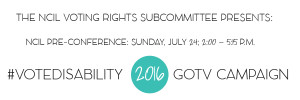Thursday, June 16, 2016, 1:00-2:30 p.m. Eastern
NCIL and FEMA have teamed up to offer training on grant funding that may be available to CILs in the event of an emergency. This webinar will be held on June 16, 2016 from 1:00 – 2:30 p.m. Eastern. We encourage you to take advantage of this webinar and learn what resources may be available to you in the event of a disaster in your service area.
To connect:
- Adobe Connect
- Phone: 1-800-320-4330 (PIN: 121808#)
- CART captioning
More information about the webinar
Purpose: To provide an overview and educate participants, National Council on Independent Living members and constituents, about how the FEMA grant programs work and what they say about disability inclusion. [Read more…]
 Did you know that there are 36 million adults with disabilities who are eligible to vote in the United States? Learn about efforts to motivate and mobilize this demographic for upcoming elections during the NCIL Pre-Conference event #VoteDisability 2016 GOTV Campaign. During this event, included with your full Conference registration, you will learn about standard Get Out The Vote (GOTV) techniques, messaging, planning, and orientation into a national disability GOTV collaborative campaign. You will leave with knowledge and resources that will enable you to become involved in 2016 disability GOTV efforts. This event is part of the NCIL Pre-Conference on Sunday, July 24: 2:00-5:15 p.m.
Did you know that there are 36 million adults with disabilities who are eligible to vote in the United States? Learn about efforts to motivate and mobilize this demographic for upcoming elections during the NCIL Pre-Conference event #VoteDisability 2016 GOTV Campaign. During this event, included with your full Conference registration, you will learn about standard Get Out The Vote (GOTV) techniques, messaging, planning, and orientation into a national disability GOTV collaborative campaign. You will leave with knowledge and resources that will enable you to become involved in 2016 disability GOTV efforts. This event is part of the NCIL Pre-Conference on Sunday, July 24: 2:00-5:15 p.m. Me Before You is the latest Hollywood blockbuster to grossly misrepresent the lived experience of the majority of disabled people. In the film, a young man becomes disabled, falls in love with his ‘carer’ and they have an incredible 6 months together. Despite her opposition, however, our hero does the “honorable” thing by killing himself at the Swiss euthanasia clinic Dignitas – so she can move on and he is no longer a burden to her. Based on the best-selling novel of the same name, Me Before You is little more than a disability snuff film, giving audiences the message that if you’re a disabled person, you’re better off dead.
Me Before You is the latest Hollywood blockbuster to grossly misrepresent the lived experience of the majority of disabled people. In the film, a young man becomes disabled, falls in love with his ‘carer’ and they have an incredible 6 months together. Despite her opposition, however, our hero does the “honorable” thing by killing himself at the Swiss euthanasia clinic Dignitas – so she can move on and he is no longer a burden to her. Based on the best-selling novel of the same name, Me Before You is little more than a disability snuff film, giving audiences the message that if you’re a disabled person, you’re better off dead.
